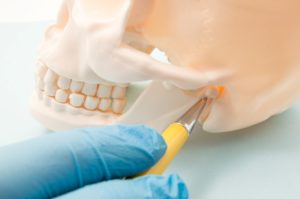February 19, 2023
Can Braces Fix a TMJ Disorder?
 Your temporomandibular joints (TMJ) are located on either side of your face. They connect your jaw to your skull, allowing you to open and close your mouth. Your TMJs let you make many movements vital for your quality of life, like chewing, talking, and yawning. However, injury, inflammation, and other issues can cause the joint to function incorrectly. Many factors can increase your risk of a TMJ disorder, like an unbalanced bite. Although braces can fix the problem, there are other solutions to stop TMJ pain.
Your temporomandibular joints (TMJ) are located on either side of your face. They connect your jaw to your skull, allowing you to open and close your mouth. Your TMJs let you make many movements vital for your quality of life, like chewing, talking, and yawning. However, injury, inflammation, and other issues can cause the joint to function incorrectly. Many factors can increase your risk of a TMJ disorder, like an unbalanced bite. Although braces can fix the problem, there are other solutions to stop TMJ pain.
What Causes a TMJ Disorder?
There’s no single cause of a TMJ disorder. Many factors can contribute to jaw dysfunction, like:
- Previous injury to the joint
- Arthritis
- Grinding and clenching teeth
- Misalignment between the upper and lower teeth
Since every mouth and situation differs, there’s no one-size-fits-all solution for TMJ therapy. Your dentist will examine your mouth and oral structures to find out what’s causing the problem to create a personalized treatment plan.
Options to Treat a TMJ Disorder
Braces offer a wide range of benefits, like treating certain TMJ disorders. Whether clear aligners or metal braces, orthodontics can fix many bite and alignment problems; however, orthodontics can be a long, costly commitment. Most dentists will recommend trying less invasive solutions first, which may include:
- Stress-Relieving Exercises: Stress can trigger bruxism. Stress-relieving exercises can reduce the occurrence of clenching your teeth. A short walk or yoga can help you unwind after a long day.
- Jaw Strengthening Exercises: Many exercises can be used to improve the strength and flexibility of your jaw.
- Nightguard: If you have a habit of grinding or clenching your teeth, a nightguard provides a protective barrier between the top and bottom teeth. It will absorb the pressure and friction to take the stress off your joints.
- Diet Changes: Your dentist may recommend eating soft foods. Limiting hard or chewy foods can prevent a TMJ flare-up.
- Oral Appliance: An oral appliance is a custom-fit device that’s worn at night. It retrains your jaw to rest in a more comfortable position to offer lasting relief over time.
- Braces: If other options didn’t provide relief, your dentist may recommend braces to stop TMJ disorder symptoms once and for all. They’ll create a personalized plan to move your teeth into their best positions. Not only will you benefit from a straight smile, but you’ll also have a balance between your upper and lower arches for optimal oral functions.
You don’t have to live with your jaw clicking or popping. Your dentist will use advanced technology and techniques to stop your pain. You won’t have to think twice before chomping down on a juicy hamburger or laughing with a friend.
About Dr. James Olsen
Dr. Olsen earned his dental degree from the University of Michigan School of Dentistry and has regularly continued his education in many specialties, like TMJ disorders and neuromuscular dentistry. He is qualified to offer advanced solutions for TMJ therapy. Request an appointment through our website or call (734) 526-4762.
No Comments
No comments yet.
RSS feed for comments on this post.
Sorry, the comment form is closed at this time.

